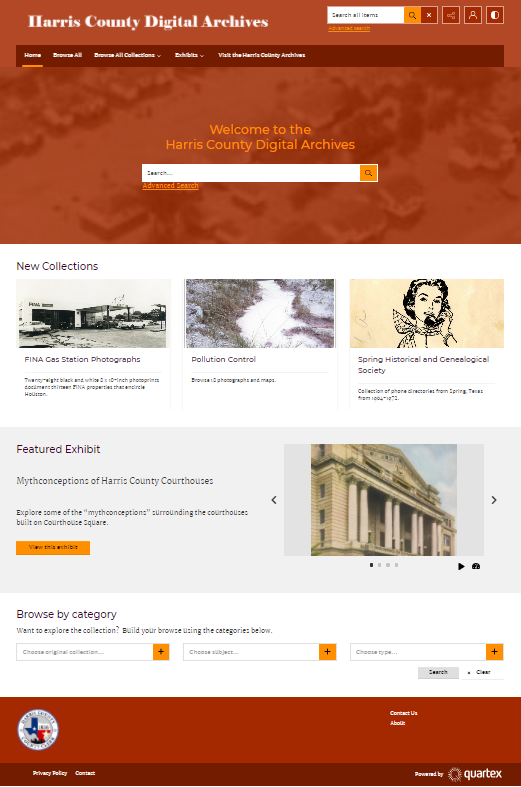Harris County Digital Archives chooses Quartex to publish brand new digital collections
Harris County Archives has launched its first dedicated collections site on Quartex, an Adam Matthew Digital platform, bringing together assets from multiple sources to showcase chapters in the County’s history.

Harris County Digital Archives (archives.hcpl.net) celebrates facets of County life over the years, with collections including photographs of FINA gas stations, 1960s phone directories from Spring, Texas, construction photographs of the Houston Astrodome, and photographs of industrial pollution in Harris County.
The site is a partnership between Harris County Archives and Harris County Public Library, which celebrates its centennial as a library system during 2021, and built and launched its own site on Quartex earlier this year.
The Digital Archives originated when the County Archivist, Sarah Jackson, contributed photographs and documents related to the Houston Astrodome, the world’s first multi-purpose domed sports stadium which opened in 1965, from the Archives collections to the Astrodome Memories project (astrodomememories.org.)
The success of this project encouraged the Archives and Public Library to identify other collections at the Archives to highlight within a publicly accessible digital platform such as Quartex. Other early digitized collections were the records from the Harris County School for Girls, the Home for the Aged, and a series of Houston Street views in the 1960s.
"When considering how the Digital Archive should be structured, we focused on the big themes we wanted to cover. It was important that individual themes could meet and intersect, making the entire digital collection more cohesive and meaningful, and that’s where Quartex’s discovery layer really helped us."
Sarah Jackson, County Archivist, Harris County Archives
Ninety collections have been migrated to the Digital Archive or built new, in-platform, with Quartex’s digital exhibits feature used extensively to deep-dive into specific themes. Five exhibitions are already live, covering themes from Harris County School for Girls 1914-1952 to “Mythconceptions” about Harris County Courthouses.
Many of the collections include printed text assets which have benefited from the Optical Character Recognition (OCR) and transcription capabilities in Quartex to enhance search and discovery.
Spring Historical and Genealogical Society’s collection of phone directories from Spring, Texas, from 1964-1972, charts the exponential growth of both the community and telephone adoption, from a nine-page directory in 1964 to a 301-page directory in 1972. OCR has facilitated discovery by extracting personal names and addresses likely to be searched by local historians and genealogists.
"Harris County Digital Archive is a wonderful resource for local history that has brought together so many items from different repositories into new, themed collections that are really user-friendly and invite deeper exploration. The collections already published are just the tip of the iceberg – there is so much more to explore, and I look forward to seeing the Digital Archive develop during the coming months and years."
Martin Drewe, Head of Customer Experience, Adam Matthew Digital
For more about the partnership between Harris County Archives, Harris County Public Library and Quartex, please contact Martin Drewe at martin@amdigital.co.uk.
Recent posts

AM’s First Folios Compared, an innovative open access collection, has been named a Best Reference resource in Library Journal’s annual list. Judges noted how the collection's 'superb execution' and 'powerful search tools' create 'exciting research opportunities.'

AM Archives Direct expands its wealth of East Asian material with the release of Foreign Office, Consulate and Legation Files, China: 1830–1939. Drawn exclusively from The National Archives, UK, Section I focuses on Wars and Treaties, 1830–1895, offering a valuable lens into Sino-British diplomacy, trade, and public health.
